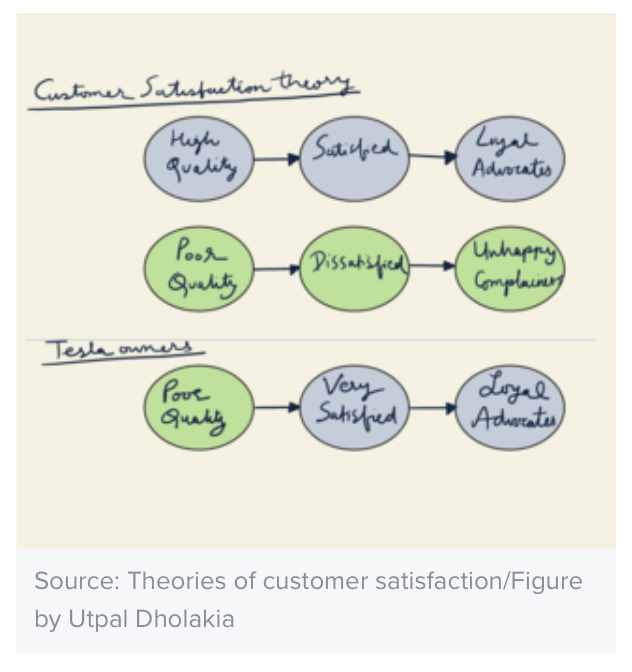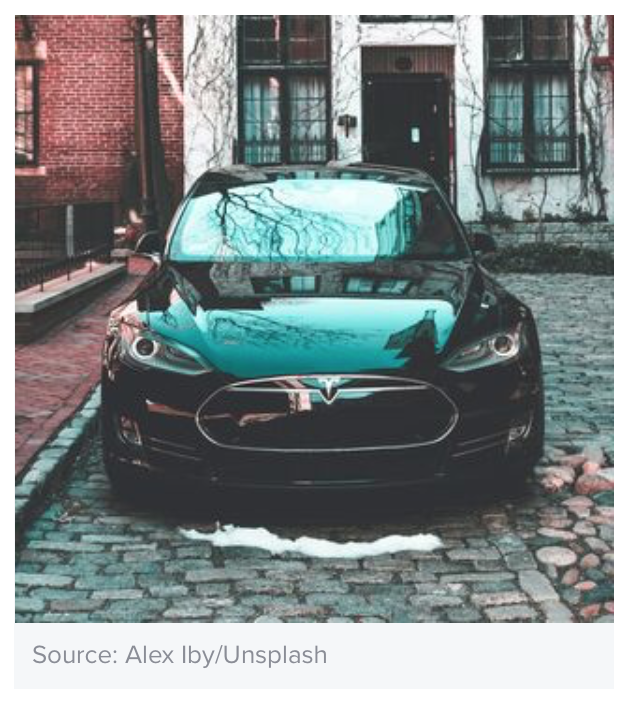Release time: 2021-01-22 21:15
The Intriguing Psychological Puzzle of Tesla Ownership
How can an expensive, poor-quality vehicle have satisfied and loyal customers?
“Oh, zero. Customer research. Haha hahaha. No. I mean. I mean, we just made a car that we thought was awesome. You know, it looks super weird.” —Elon Musk, CEO of Tesla, Inc., when asked if Tesla conducted customer research in designing their new vehicle.
There’s something peculiar about the psychology of Tesla vehicle owners that runs contrary to every well-accepted theory about how customers are supposed to behave. Our understanding of customer satisfaction is based on decades of research. It relies on data from hundreds of thousands of customers in every conceivable industry (even the IRS and U.S. Postal Service are included). Core to this research is the idea that a product’s quality influences customers’ satisfaction, leading to loyal attitudes, marked by repeat purchases and positive word of mouth. In other words, high-quality products make satisfied and loyal customers, and poor quality products make dissatisfied and unhappy customers (see the figure).

Tesla has turned this theory of customer satisfaction on its head. To see why this is the case, consider the following two data points about the quality of Tesla vehicles and the customer satisfaction of Tesla owners.
Tesla Quality
In the 2020 Initial Quality Study conducted by the marketing research company J.D. Power, Tesla was the worst-performing company, reporting 250 problems per 100 vehicles during the first 90 days of owning a newly purchased vehicle.
Tesla Customer Satisfaction
The 2020 J.D. Power Automotive Performance, Execution and Layout (APEAL) Study measured owners’ satisfaction based on their “experiences with design, performance, safety, usability, comfort, perceived quality, and other factors.” In the study, Tesla received the highest score of 896. To give context, Porsche had the next highest score of 881.
The Psychology of Tesla Ownership
Two studies from the same marketing research company, but with completely different results. Tesla customers own a (relatively) inferior product yet are very satisfied and loyal. How is this possible? How can a brand be the worst performer with respect to quality and yet be the most beloved by its customers? We can speculate and provide two explanations that, in reality, boil down to one underlying reason.
Explanation 1: Consumers buy Tesla vehicles for reasons other than reliability or the functional aspects that they use to judge other vehicles (horsepower, cost per mile of driving, etc.).
Explanation 2: Tesla owners are far more forgiving of problems with their vehicles than owners of other vehicle brands.
Both explanations boil down to the fact that even though Tesla makes relatively mundane products (automobiles) that are judged mainly for their functional characteristics, its customers are using an entirely different decision calculus to evaluate Tesla vehicles (and the brand).
Tesla Investors Feel the Same Way
We only have to look to the stock market for evidence that Tesla is seen differently than other automobile brands. Just like the disconnect between the quality and customer satisfaction of Tesla vehicles, Tesla’s stock price shows a remarkable break from established business valuation theories. On average, other automobile companies’ stocks are priced at around 20 times their annual earnings (for example, GM’s stock is 23.1 times, while Toyota’s is 16.1 times its annual earnings). By comparison, Tesla’s stock is 1,635 times its yearly earnings as I write this. Tesla’s investors, like its customers, see the company through rose-colored glasses in a way that defeats economic theory.

Tesla Owners Focus on the Brand's Future Vision, Looking Past the Present
These dissociations from conventional theories arise from the glorious vision Tesla’s customers and investors share of the company’s future. Essentially, their vision is divorced from the present reality.
Tesla makes cars with the latest technologies, such as electric power, self-driving technology, over-the-air software updates, and an autopilot that are years ahead of other vehicles. What’s more, it has a charismatic, eccentric founder in Elon Musk, who’s considered to be a visionary in the vein of Steve Jobs. Owning a Tesla vehicle (or stock, for that matter) is meaningful in a way that owning other products and services are not because it gives customers a rare opportunity to link their self-identity with many positive and rarely-to-be-found qualities.
It is for delivering a glorious vision of the future that customers are willing to discount and forgive Tesla’s current problems and inconveniences and love the brand. This behavior is an anomaly that other brands cannot replicate. For consumer psychologists, the reactions of owners and investors to the Tesla brand is the exception that proves the rule.

Utpal M. Dholakia, Ph.D., is the George R. Brown Professor of Marketing at Rice University.
Online: Utpal's website at Rice University, Twitter, Facebook, LinkedIn
psychology today